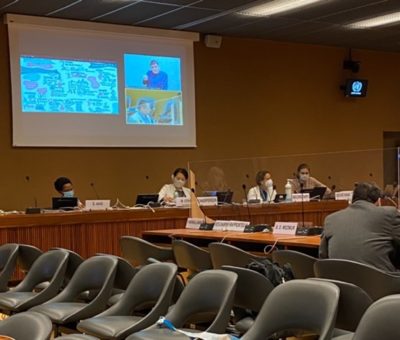Berthe De Vos, SI UN Representative in Geneva, reports from the 88th Session of the Committee on the Rights of the Child (CRC).
“Previously, at the 81st Session, the CRC agreed to hold a ‘Day of General Discussion’ (DGD) every two years, on a specific topic or a set of articles. The aim of these DGDs is to increase understanding of how the contents of the Convention on the Rights of the Child are received by State parties and review the implementation of the international standards and progress made since the adoption of the Convention by the Member States.
On 16 and 17 September, the DGD concentrated on children living without parental care or children deprived of liberty. These normative discussions are associated between the CRC and the Committee on the Rights of Persons with Disabilities (CRPD). The articles relevant to children in, or at risk of being placed in, alternative care in both conventions are indivisible. So, to know what needs to be done to identify key changes to achieve the international and national goals in the field of child protection and alternative care both conventions need to be respected by the State members.
The context of the discussion was as follows: “Children are placed in alternative care in a plurality of social contexts and for multiple reasons. The care settings these children live in vary greatly in the content, quality, and duration of care. Importantly, children in alternative care are not a homogenous group but are children with manifold and complex circumstances and needs as well as resilience and strengths, which call for correspondingly different strategies in preventing family separation, developing appropriate care solutions and actions aimed at de-institutionalisation.”
The aim of these two days was to comprehensively review the current situation of alternative care and its complexity for children and their families. As part of a public consultation all interested stakeholders, whether adults or children, private or public institutions are encouraged to take part in the discussion. The special intervention of the Committee’s Youth Advisory Team (YAT) was welcomed.

The Committee on the Rights of the Child discusses alternative care at the 88th Session
After the welcoming by the chairperson Mikio Otani there were presentations of different regional stakeholders, followed by short interventions of children and young people expressing their needs and hopes. Remarkable was the fact that they expressed the desires of a “home”.
During the plenary session, Committee members pointed out the importance to tailor interventions to meet the needs of children depending on their family or own situation (e.g the so-called “street children”). The quality of care was not just a question of material well-being but is also a right and must come to the benefit of the child. Necessity and suitability of care are key elements in the discussion of alternative care.
The Committee organised 5 workgroups each concentrating on a specific topic:
- Ensuring all children grow up in safe and nurturing families: Strengthening families and communities to prevent separation (with lessons from the pandemic),
- Addressing the care needs and rights of children who are separated, unaccompanied or without care,
- Access to Justice and accountability for children and young people in alternative care, their families, and adults who grew up in care,
- Delivering appropriate quality alternative care services,
- Transforming the system towards family and community-based care.
Conclusions of the workgroups were presented by CRC Members, Dr. Rinchen Chophel and Dr. Velina Todorova: the demand of “tailor interventions” to meet the needs of children were the most important words of the day. Furthermore, the need for appropriate quality alternative care services, the necessity of transforming the system towards more family and community-based care as first refuse and seeing placing as an extreme measurement.
Closing remarks were made by Mrs. Ann Marie Skelton: “money can’t buy you love but put the money where the love is”. Money could give support to families so that children could have the possibility to remain in their families and this gives a much better alternative care. Avoid separation of the children and when it is necessary children have the right to receive the best care possible. Make the world a better place for children to ensure the future!”
To read a comprehensive overview of the 88th Session of the Committee on the Rights of the Child, please click HERE.

